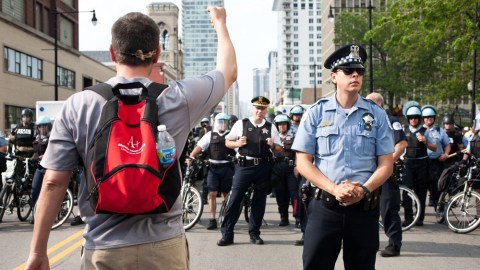Is America Free?
America is much like the Hotel California: “You can check out anytime you like, but you can never leave.”

Sign up for the Smarter Faster newsletter
A weekly newsletter featuring the biggest ideas from the smartest people
“I’m proud to be an American, where at least I know I’m free.” –Lee Greenwood
Notwithstanding the earnest patriotism of Lee Greenwood’s anthem, “God Bless the USA,” something about that particular lyric has always rankled. There’s a passive-aggressive prickliness to that “at least” in there, as though it were the final rejoinder of an American arguing in an airport bar, leaving a piece of his mind with some over-served Belgians before slapping down a wad of pink, local currency as apourboireand hustling to his departure gate for Orlando International.
If he had stayed to chat a little longer, this notional American might have found that his Flemish interlocutors enjoy greater freedom than he, even in the shadow of the bureaucratic colossus based in Brussels, commanding their continent with unchecked power. Or he may simply have discovered, as we all must, that not all song lyrics are true.
Americans of every political stripe are forever banging on about how free they are, without any scale of comparison. It is a time-consuming précis of any such discussion to have to explain to them how their own system works.
This means you, Mr. Ugly American – yes, you with the giant foam cowboy hat and air horn, and you, Mr. Harvard Yard Fancypants with yourpince-nezand Rousseauean predilections – your free country locks people up at a rate thirteen times faster than its population grows, and holds one quarter of all the prisoners in the world. Six million of your fellow citizens living abroad, plus millions more of their families, business associates, and people with US ties are required to file with the IRS and send taxes to America, even if they never set foot on your soil. The content of every email you send is intercepted and saved by your government. Not judging you for all this, but figured you should know.
At times, criticism of America is met with hostility and assorted “love it or leave it” nincompoopery from patriots who do not comprehend how the country operates. To wit, in the words of another famous song, America is much like theHotel California: “You can check out anytime you like, but you can never leave.”
With millions of illegal entrants, and a tax authority zealously guarding the exits, America seems less difficult to get into than to get out of. Recently, I asked an US Consular official about the record number of Americans attempting to renounce their citizenships in recent years. He stressed the complexity, expense and difficulty of the process, in which all financial information of the citizen, their family and associates must be collected and submitted, along with an “exit tax.” The bulging dossier is sent to overseers in Washington, DC, at which point the Land of the Free will, “decide whether to let you go.” The Soviet-style institutional assumption being, should you choose not to dwell in this demi-paradise,ipso facto, you must be some kind of criminal.
Asking if America is free becomes a relative exercise. Free compared to what? Compared to North Korea? Sure. How about, compared to other Western nations or, more importantly, to the ideals of its Founders, whose constructs intended America to be the world’s greatest experiment in human endeavor and liberty?
Among the questions prospective new Americans might be asked on their citizenship test is, “What is the supreme law of the land?” The correct answer, as specified in the official study guide, is: “The Constitution.”
Few have been as brazen in pronouncing the Constitution an unwelcome anachronism as was President Woodrow Wilson, though the last century has seen a peculiar, penumbral crusade to twist the plain meaning of the document, while theoretically preserving its primacy. This is how you get to folks supposing James Madison would be A-OK with partial-birth abortion or banning Nativity scenes at Christmastime.
But the reason the Framers did not attach a Rosetta Stone or decoder ring to the Constitution is because the language is plain enough. They understood that less is more, and it is often observed that the Bill of Rights is a list of negative liberties – things the government cannot do – and not one of those ten Amendments is rendered in words that are indecipherable or too numerous to read.
Take, for example, the very first one: “Congress shall make no law respecting an establishment of religion, or prohibiting the free exercise thereof; or abridging the freedom of speech, or of the press; or the right of the people peaceably to assemble, and to petition the government for a redress of grievances.”
That means we can speak our minds in America. No legislator, no matter how adamant or esteemed, may write a law that prevents us from doing this, even at election time (Sen. John McCain, please call your office).
Yet here we are, with almost every aspect of that straightforward proscription demonstrably violated by America’s own government – and the rest of the Bill of Rights in not much better shape.
Recent scandals at the IRS, the National Security Agency and the Department of Justice have renewed Americans’ interest in reclaiming their freedoms. This is encouraging. What is discouraging, however, is the extent to which the debate has become reflexively politicized.
Left and right fight so predictably, even a casual observer of politics could recite both sides now (with apologies to Joni Mitchell). The ideological arguments practically write themselves. Let’s not do that, this time. There is ample blame due both Republicans and Democrats for America’s oppressive and corrupt condition.
A handy example: George W. Bush should not have created the Department of Homeland Security. Barack Obama should not have preserved and expanded it. The next president should abolish it.
Law professor Jonathan Turley writes in theWashington Postof the administrative state, which he calls “the fourth branch of government.” He notes that, “in 2007, Congress enacted 138 public laws, while federal agencies finalized 2,926 rules, including 61 major regulations.” In this context, it is irrelevant who resides in the White House or holds the Speaker’s gavel. America is not a nation of laws, but of rules. Only a renewed cultural will to true reform, coupled with political leadership, can correct that.
Senators Rand Paul and Ted Cruz are among the very few major politicians speaking out in favor of undiluted Constitutional freedom. If and when they run for president, one hopes their advocacy will find a larger audience, regardless of their prospects for victory. And this need not be only a Republican tack. If there is a Democrat who truly believes in scaling back the power and scope of the federal government, we should support that person, too (and one assumes such a Democrat would be easy to spot, as he or she will be riding a unicorn while collaborating with a leprechaun to perfect cold fusion).
Left or right, if people mean what they say about the sanctity of personal freedom and human dignity, now is the time to bring those convictions to bear.
We have learned of the IRS harassing citizens and the DOJ investigating journalists for exercising their First Amendment rights, and the NSA collecting Americans’ phone records and emails. Meanwhile, DHS retains the right to copy the content of phones and computers at border crossings, erects checkpoints along the country’s roads and railways, and the Supreme Court has given its imprimatur to police extracting DNA samples from people who have been convicted of no crime.
Those who cried loudest that water-boarding or “torture” should not be used on hostile foreigners should be equally adamant that citizens not become government property (sorry, Sen. McCain, could you call back, just for a sec?). Similarly, abortion advocates who for decades have told government to keep its hands off their bodies could apply that slogan to the TSA’s abuse of travelers at America’s airports.
Many of these excesses are undertaken in the name of America’s infinitely elastic “War on Terror.”
Which means what, exactly? Stipulating that this vast and obscene apparatus could not detect Islamist terrorists like the Boston Marathon bombers and the Fort Hood shooter (the latter of whom should have been easy to spot at half the price, since he was a US Army Major who had conducted official seminars on the gruesome things that should befall infidels), let us also assume there are many other plots we never hear of, prevented by these very methods.
But if so, so what? Does this actually save lives? Perhaps. But the Constitution was intended to codify freedom, to lay out God-given liberty such that while they live, future generations could surpass mere survival to enjoy unfettered humanity.
At some point, the suggestion that liberties must be curtailed in order to be preserved becomes very difficult to defend.
The elemental question of whether America is free, therefore, begets myriad other questions, including:
Why does America hold more prisoners than any other country in the world?
Why does America demand taxes from people who don’t live in America?
Why does America’s tax authority oversee political speech, religious worship and health care?
Why do government drones conduct surveillance of private property from America’s skies?
Why does America’s government collect the phone records and emails of its people?
And why does America seek to force such practices upon other countries?
Some may respond with a legal or military rationale for this policy or that. But we cannot reply with the simple answer we would most like to give:
“Because America is free.”
TheoCaldwell, host of TV’s Global Command Centre, has been a member of the New York Stock Exchange, the Chicago Board Options Exchange, the American Stock Exchange, and the Kansas City Board of Trade. He can be reached attheo@theocaldwell.com
This article originally appeared in The Daily Caller. You can read the original here.
Sign up for the Smarter Faster newsletter
A weekly newsletter featuring the biggest ideas from the smartest people





